The Western Australian Waste Authority provides advice to the Minister for Environment and is responsible for the administration of the Waste Avoidance and Resource Recovery Account, in accordance with the Waste Avoidance and Resource Recovery Act 2007 (WARR Act).
Our work supports the vision of the Waste Avoidance and Resource Recovery Strategy 2030 (waste strategy):
"Western Australia will become a sustainable, low-waste circular economy in which human health and the environment are protected from the impacts of waste."
The waste strategy
The waste strategy builds on Western Australia’s previous waste strategy, Creating the Right Environment, which was introduced in 2012 and achieved significant improvements in recycling, reducing waste generation, diverting construction and demolition waste, and better managing commercial and industrial waste.
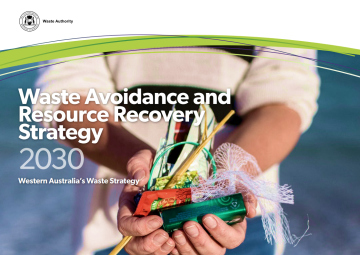
The business and action plan
The Waste Authority business and action plan 2023–24 sets out how WARR account moneys are applied to the programs and activities that support the implementation of the waste strategy. It also outlines the specific actions, timelines, lead responsibilities and collaborations that will be progressed to achieve the waste strategy’s objectives. Please note this document streamlines and combines the information that in previous years constituted two separate documents, the business plan and the action plan.
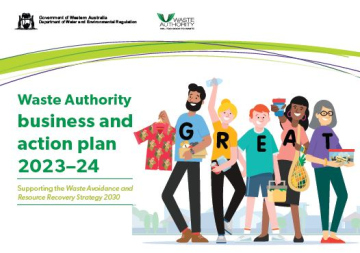
The vision
This vision is supported by the three following objectives which reflect the waste hierarchy, whereby waste avoidance is the most preferred outcome and disposal is the least preferred:
- avoid – Western Australians generate less waste
- recover – Western Australians recover more value and resources from waste
- protect – Western Australians protect the environment by managing waste responsibly.
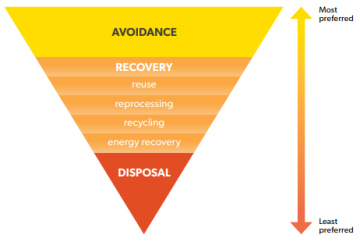
The waste strategy’s vision, objectives, high-level targets and headline strategies are, as follows:
Avoid
Western Australians generate less waste.
2025 – 10 per cent reduction in waste generation per capita
2030 – 20 per cent reduction in waste generation per capita
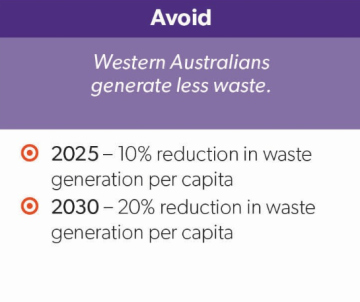
Recover
Western Australians recover more value and resources from waste.
2025 – Increase material recovery to 70 per cent
2030 – Increase material recovery to 75 per cent
From 2020 – Recover energy only from residual waste
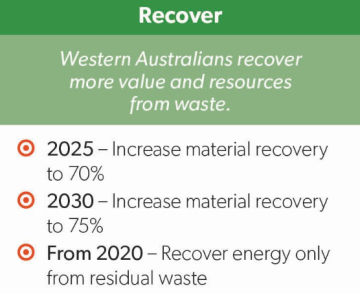
Protect
Western Australians protect the environment by managing waste responsibly.
2030 – No more than 15 per cent of waste generated in Perth and Peel regions is landfilled
2030 – All waste is managed and/or disposed to better-practise facilities
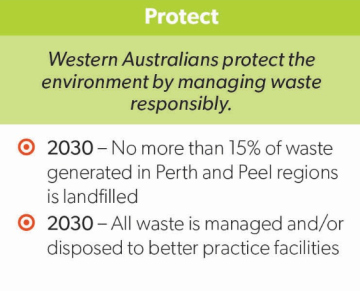
We are committed to the achievement of the objectives and targets of the waste strategy through the activities outlined in the action plan, and to the State Government’s Our Priorities: Sharing Prosperity program, to make Western Australia a low-waste society.
The WARR Act
As determined in the WARR Act, we prepare a draft annual business plan for the approval of the Minister for Environment. The annual business plan describes the priority programs and initiatives which support the achievement of the objectives and targets of the waste strategy. As part of developing the annual business plan, we make recommendations for the application of WARR Account moneys for the approval of the Minister for Environment.
Section 36 of the WARR Act prescribes that the business plan must set out:
- our objectives and priorities for the next five financial years
- financial projections for that period
- our budget for the next financial year
- the services and facilities that are reasonably necessary to be provided or used under section 16 for the next financial year in order to enable us to perform our functions
- what we intend to do over the next financial year
- our policy for the application of moneys from the WARR Account for the next financial year
- a priority statement with respect to extended producer responsibility schemes in accordance with section 47
- any other matters that the Minister requires in writing.

